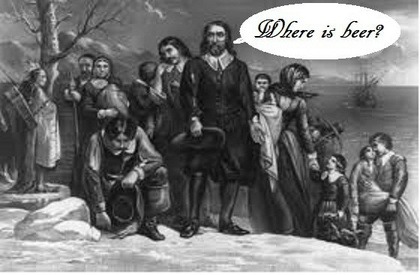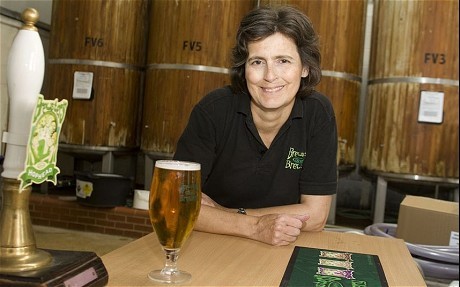Women And Beer: The History Of Each.
March brings us many things. Warmer weather, warmer temperatures and most important, All of us need to celebrate something very special. March is Women's History Month. As we celebrate and enjoy our better half (You KNOW this is true), it's important that we discuss some fact's about womens contributions to our favorite beverage, BEER! In fact, Dear Reader, its quite likely you arent familiar with a few things and I'm here to set the record straight.

Beer dominates and entertwines the history and culture of people. It's often theorized beer itself was discovered around 8-10,000 years ago, and was likely the reason for humans beginning the transformation from hunter-gatherer to domesticity. They discovered planting grains and harvesting those grains was a far more effective (and uses less energy) than chasing down herds of animals for months at a time. Often, men went out and did the hunting and women tended the household. Which, likely, was the farming/fields. The theory goes that a basket of grains was left in the rain began the chemical process of Fermentation. Wild yeasts in the air joined the fray and the next thing they knew, they got out the Stone Hot Tubs, had some Mammoth meat delivered and had a party.

We know beer was made around 7,000 years ago in Iran. We have pottery that has been submitted to chemical tests. This barley beer was found at Godin Tepe in the central mountains of Iran. Small pieces of a jug was found to be coated with "beerstone", which was a by-product of brewing. Over in Mesopotamia (now Iraq/Syra) is some of the oldest evidence of more "modern" beer. A stone tablet that depicts people drinking through reed straws out of a large bowl. It was common then to use straws to seperate the sedement.

Hymn to Ninkasi
Borne of the flowing water,
Tenderly cared for by the Ninhursag,
Borne of the flowing water,
Tenderly cared for by the Ninhursag,
Thus begins written history of women and beer. This was written by a Sumerian poet, found on a clay tablet around 1800 B.C. I won't list the entire poem (you can read it here), as its quite lengthy, but as translated, its the first known written recipe for beer! Ninkasi was a Sumerian Goddess, thought to be of brewing and beer. It's thought that she was the Head Brewer to the God's themselves! Her name translates to "The Lady who fills the Mouth" It's exciting to think that women were the early brewers of the nectar we know and love. She likely stirred her finger in each batch for extra sweetness.

Siduri – No ordinary tavern-keeper
According to her role in the Epic of Gilgamesh, Siduri is many things, depending on the version of interpretation you read. Some portray her as a barkeep of the Underworld. Others have her basking on a beach, running her tavern there, in the sunshine. Regardless of the version, she inevitably attempts to dissuade Gilgamesh from his journey in finding a way across the "waters of death" and directs him to Urshanabi, the ferryman, for safe passage.
She is considered an "alewife". This was a term first coined in the 15th century to describe a "brewster" (feminine of brewer), however, it was used in translations through written history to describe any woman who brewed ale in that period. In Mesopotamia, women were principal brewers, at a time when beer was of great importance. Not only was beer consumed during the work day, it was also used in trades, as well as payment for services, such as a days work. Of utmost importance, it purified the water in ther fermentation process, making water safe and palatable.

So, lets fast forward to American colonization days. It's often theorized that beer discovered America. How? Dear Reader, I am glad you asked. It's important to know the TRUE history of our great nation. So, before leaving, the Nina, Pinta and the Santa Maria would have filled their casks with beer. Why? Because, for one, beer sanitized water, making it drinkable and would not spoil nearly as fast, especially with the addition of hops, which acts as a preservative. Now, they would have supplemented their water needs from rain water, but low alcohol content beer would have been a staple on the 2-3 month voyage. "We could not take much time for further search, our victuals being much spent, especially beer," wrote William Bradford in his firsthand account History of Plimouth Plantation.


Upon seeing the shore line, they decided to pull over, have a smoke, get some directions, and replenish their beer stock. Well, to do this, they had to setup camp. In setting up camp, they discovered streams and wild life and a beautiful, yet rugged country. Thankfully, they decided to stick around. Women, once again, showed their prowess at brewing. Many brews were made with pumpkin, wheat, oats and honey. They also brewed beer with birch and spruce, which were substitutions they expiramented with. In doing this, several Colonial governments decided to institute purity type laws, very similar to Germany's Reinheitsgebot, although, Germany's purity laws had been in place since 1487. This act from Colonial governments also stands as some of the first ordinances passed and regulated, making it some of the first "consumer" type laws in place. Beer, at the time, also provided a nutritional benefit, in a diet which was often lacking certain minerals. On May 24, 1607, the first recorded free IHOP pancake day was created in the new colony. Ok ok. Not true. But the first feast was. And that included copious amounts of beer and cider. It's notable, and I hope I have impressed upon you, Dear Reader, the importance of this brew. It was not the pleasureable liquid we consume today. Beer was a staple. An absolute necessity of society. The Pilgrims experienced a critical shortage during their first few months in town. Fortunately, our explorers exhanged ingredients with Indians, beer for corn. Thus, Budweiser was born. In fact, once permanent homes were built, wives were almost always afforded a "kitchen brewery".

Brewsters were making beer in their homes but also making small batch beer for local taverns or inn's. Often, taverns were built first in the community, after housing, as it provided a place for communal gathering, as well as respite for weary travelers, which was akin to the internet then. How else were you to get your news from the next town over, or even from another territory! The time dictated that women did not drink in public, but that did not mean they couldnt imbibe their brew in their own home. As we now know, it was common place for women to have the job of tavern-keeper. They were known for making a particularly strong ale called "groaning beer", to relieve other women in labor from pain.

As we move forward in our beer timeline, we find that, in modern day, women are still perfecting the craft they've worked so hard at through the years.
Carol Stoudt – One of the first microbrewers in Pennsylvania, Carol brought beer to the area in 1987. She also owns and operates the Black Angus Steakhouse. Stoudt Brewery brews a pils, American Pale, and an English Style ale called "Scarlet Lady Ale", an American Double IPA, as a well as a Belgian-Abbey style ale, along with several stouts.

Deborah Carey – Founder and President of New Glarus Brewing. She was the first women to open and run a brewery in the U.S. Located in New Glarus, Wisconsin, the brewery was founded in 1993 and quickly rose to fame. In 2006, the new expansion and $21 million dollar facility was designed to resemble a Bavarian village and is a top tourist destination in the area. Her company gives around a $40 million dollar boost to the region's economy.

Sara Barton – Owner and Operator and Head Barrel Washer of Brewster's Brewery in Grantham, England. 20 years ago, Sara finished a Master's Degree in Brewing from Heriot Watt University in Edinburgh. In 1997, after a stint working with Eli Lilly, she returned to her life's passion and started her brewery. In 2012, she was voted as Brewer of the Year by the British Guild of Beer Writers.

Meg Gill – Co-founder of Golden Road Brewing and at 28 is the youngest brewery owner in the U.S. Forbes Magazine names her as one of its "30 under 30" to watch. And watching this young lady is a pleasure, as she is easy on the eyes, an exceptional brewer and business person. Golden Road rocked 15k barrels last year and expects to double that in the year following. Before co founding Golden Road, Meg sold Oskar Blues brew from an R.V.

Nicole Erny – One of a handful of Master Cicerone's in the world, as well as the first female Master Cicerone and the youngest Master Cicerone. The Cicerone series of tests applies your beer knowledge from start to finish in a series of exams. The first, Certified Beer Server, is an online test, designed to test basic knowledge. The second, Certified Cicerone, is decidely more complex, requiring a sitting and monitored exam covering brewing methods, equipment used, off flavors identification and much more. Ciceron.org explains it as "Those who achieve this certification have a deep and well-rounded knowledge of beer and beer service as well as competence in assessing beer quality and identity by taste." The third, and most complex, is the Master Cicerone. At my last count, there were ten in the world. Nicole is one of those ten. She had to participate in a rigorous two day exam that included multiple written, oral and tasting tests. Think Beer Dr. Nicole is a master of her craft and a testament to lovers of beer around the world.

As you can see, throughout the history of mankind, women have been dominant in not only the making of beer, but forming who we are as a world and as a people. I would no more hand a woman a "pink" colored beer, than I would offer her a fruity cocktail. Times have changed, again and again, and I believe history has now once again come full circle and women are recognized as having outstanding talents when it comes to brewing, tasting and drinking beer. Immediately, you should stop what you are doing, and thank the woman closest to you. Just thank her. And smile. You dont need a reason or to explain why. Just show a little gratitude. She may just be a direct descendant of the beer goddess herself. Oh, and hey, go get her a beer for a change.